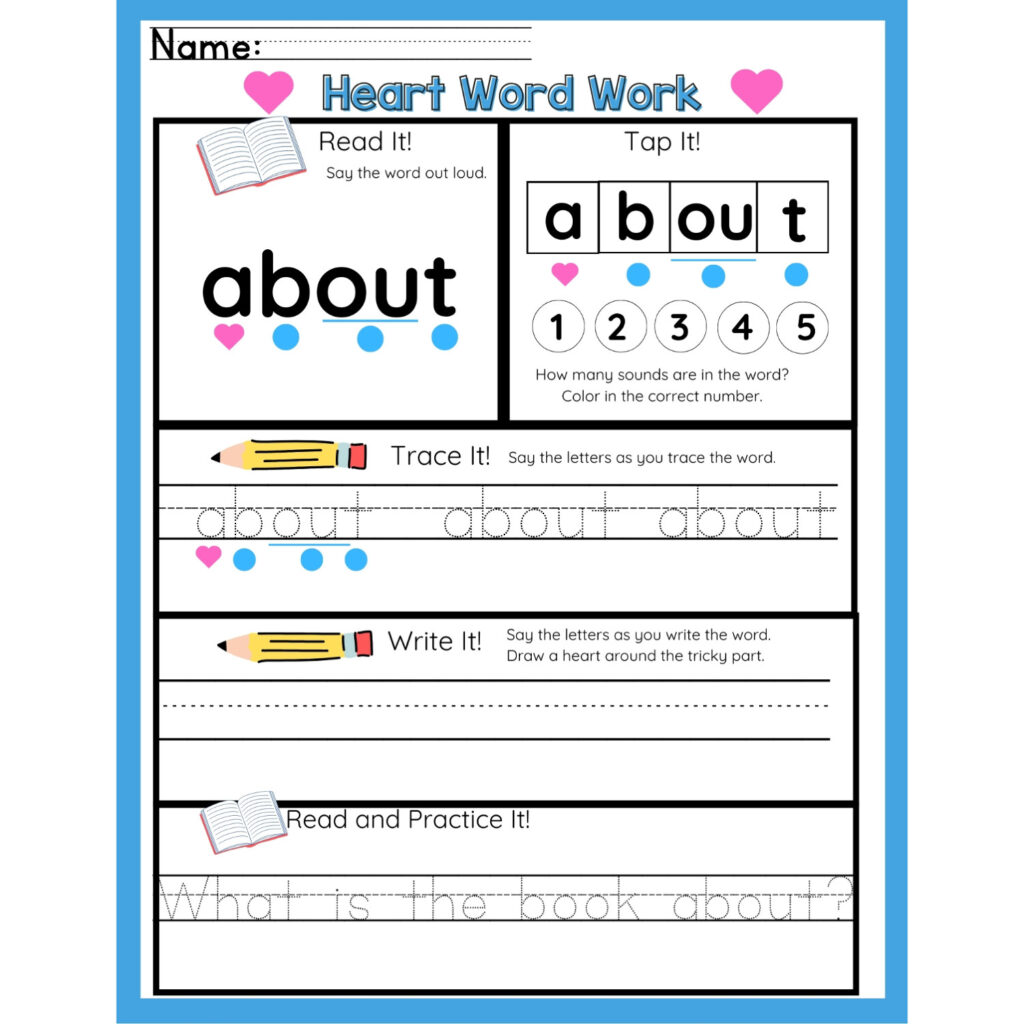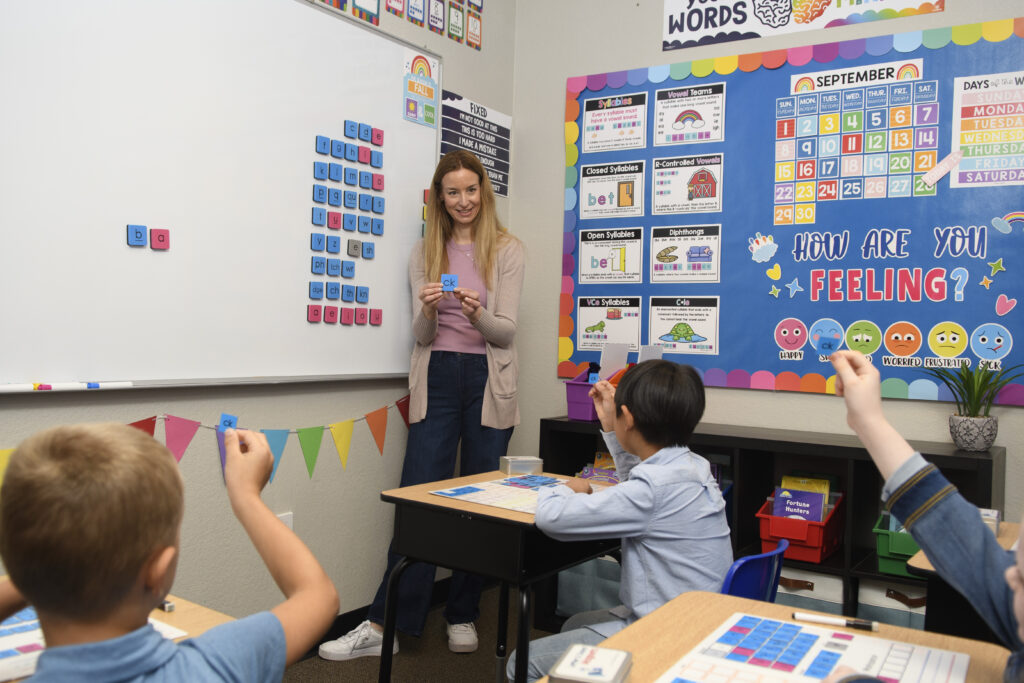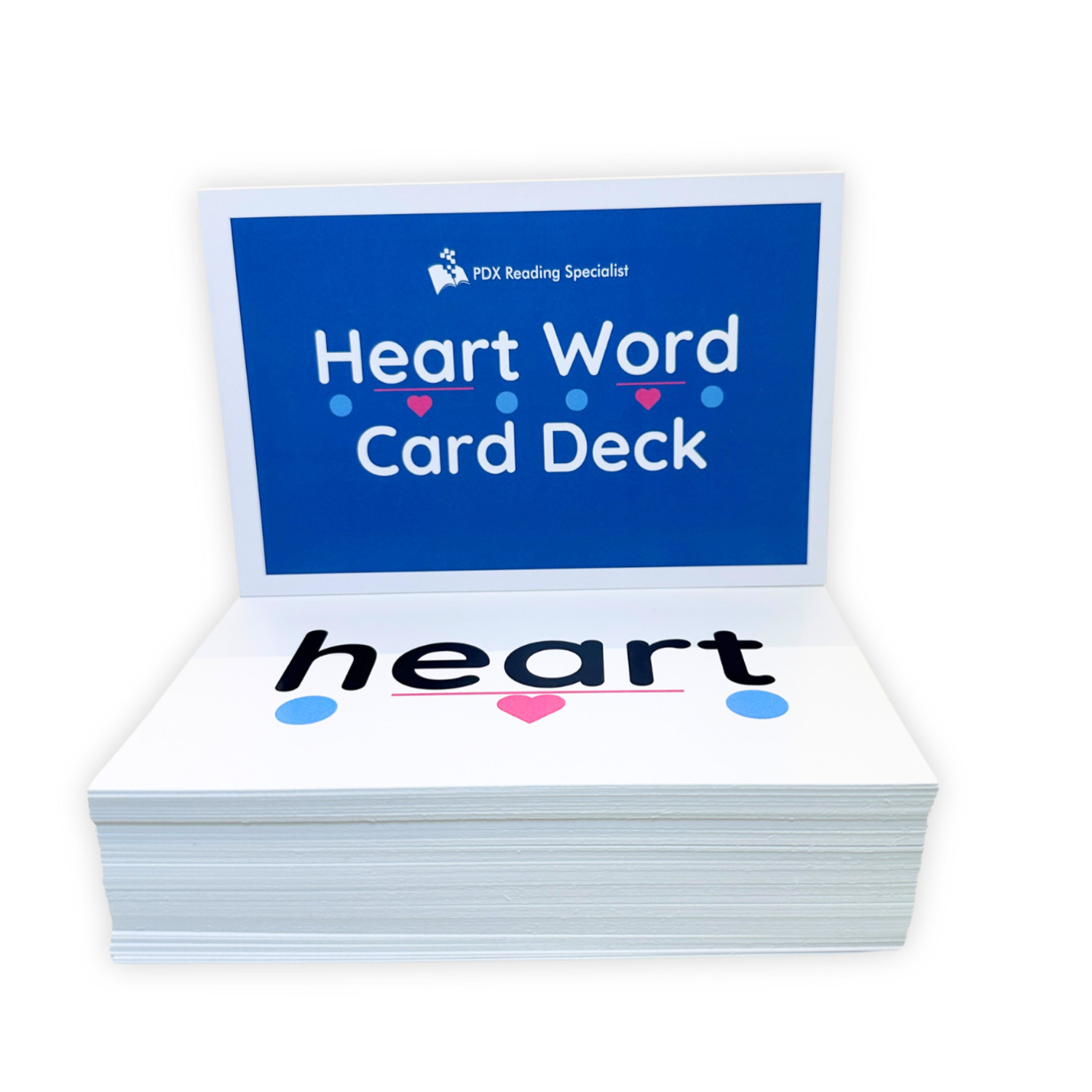Teaching a child to read isn’t just about phonics and memorization, it’s about understanding how the brain processes written language. While most words in English follow predictable spelling patterns, some do not. These are the words that stump even strong readers: said, was, come, and friend, for example. They’re known as irregularly spelled words or heart words, and they require a special approach rooted in science.
In this post, we’ll unpack the research behind teaching irregular words effectively, explain what makes these words so tricky, and show you how PDX Reading Specialists’ Heart Word Cards can make all the difference in your child’s literacy journey.
Why Some Words Don’t Play Fair
English is largely a phonetic language, but it’s also a bit of a rebel. Due to centuries of influence from Latin, French, and German, many English words break the typical phonics rules. Think about the word said, there’s no logical reason that “ai” sounds like a short “e.” Or take come, why isn’t it spelled cum if we’re going by sound?
These rule-breakers can’t just be memorized by rote. In fact, rote memorization often fails students with reading difficulties like dyslexia. Instead, children need a way to anchor these tricky words in their brains. That’s where the Heart Word Method, and the science behind it, comes in.
The Role of Orthographic Mapping
The Science of Reading tells us that orthographic mapping is key to making any word a sight word (a word a child can read instantly). This cognitive process involves connecting the sounds in a word (phonemes) with the letter patterns (graphemes) that represent them.
Here’s the catch: Irregular words still follow this process, just not entirely.
Take the word was. The /w/ and /z/ sounds map predictably to “w” and “s”. But the “a” doesn’t say its usual name or sound. That irregular piece is what we call the heart part, the part we “have to know by heart.”

What Are Heart Words?
Heart Words are high-frequency words that contain at least one irregular sound-spelling match. The key to teaching them is not to throw the whole word at students and expect blind memorization. Instead, we:
- Map out the sounds in the word
- Match the regular phonemes to graphemes
- Highlight the irregular part as the “heart part,” this is the part students need to remember
This multisensory approach taps into visual, auditory, and kinesthetic learning pathways, making it far more effective than flashcards alone.
The Research Behind the Method
Several key studies and thought leaders in literacy education support this approach:
- Dr. Linnea Ehri, a leading reading researcher, explains that orthographic mapping is essential for turning unfamiliar words into instantly recognizable ones. This applies to all words, including irregular ones.
- The National Reading Panel (2000) concluded that systematic phonics instruction benefits all children and is especially critical for those who struggle.
- The Science of Reading framework now widely adopted in school systems, emphasizes structured, explicit instruction in both regular and irregular word reading.
These findings reinforce that irregularly spelled words should still be decoded to the extent possible, and that we only “learn by heart” the truly irregular parts.
How Heart Word Cards Help
At PDX Reading Specialists, we’ve translated this science into practice with our Heart Word Cards. Each card is carefully designed to:
- Visually isolate the heart part of the word, often in a different color or marked with a heart symbol
- Support phonemic awareness by prompting students to identify each sound in the word
- Encourage multisensory interaction, such as tracing, saying, and writing the word
- Use spaced repetition to help the word move from short-term to long-term memory
Teachers and parents love how these cards reduce frustration and increase retention for struggling readers.
Common Myths About Irregular Words
Let’s clear up a few common misconceptions:
Myth 1: Irregular words can’t be decoded at all.
Reality: Most irregular words are only partially irregular. Students can decode the regular parts, which builds confidence and reinforces phonics.
Myth 2: You should memorize sight words as whole units.
Reality: Memorization without decoding leads to shallow learning and poor retention. It bypasses the orthographic mapping process.
Myth 3: Heart Words are only for students with dyslexia.
Reality: All students benefit from structured word learning. Heart Word methods are universal tools that support brain-based learning.

How to Teach Irregular Words Effectively
Here’s a simplified version of an effective routine using Heart Word Cards:
- Say the word aloud
Let the student hear it in context or a sentence. - Segment the sounds
Clap or tap out each sound in the word. - Map the sounds to letters
Use Elkonin boxes or word mats to write regular graphemes. - Identify the heart part
Mark the irregular letter(s) with a heart or color. - Write it, trace it, say it
Multisensory repetition cements the word in memory. - Review frequently
Cycle back to review previous heart words regularly.
Why It Works
This method works because it’s aligned with how the brain learns. When we tie sound, symbol, and meaning together, and isolate the tricky parts, we’re actually training the brain to recognize these words instantly. That’s the true definition of a sight word.
Instead of guessing, students are learning. Instead of memorizing randomly, they’re making connections. And instead of frustration, we see progress.
Conclusion: Let the Heart Lead the Way
Teaching irregularly spelled words doesn’t have to be a guessing game or a battle of wills. By grounding our instruction in the Science of Reading and using tools like Heart Word Cards, we give students the tools to succeed. These aren’t just flashcards, they’re brain-based, research-backed literacy tools that truly make a difference.
Whether you’re a parent supporting your child’s reading at home, or an educator looking for more effective strategies, PDX Reading Specialists has your back.
Ready to Make Irregular Words Stick?
Shop our Heart Word Cards today and bring science-based learning into your home or classroom. Because every child deserves to unlock the joy of reading, one heart word at a time.


